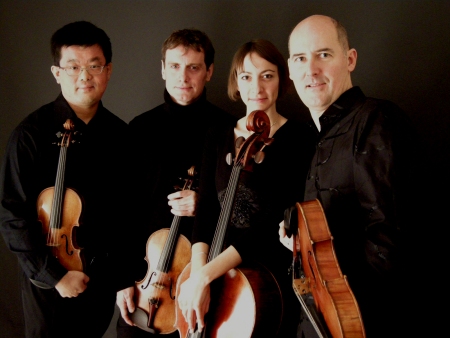By Stephen Brookes • The Washington Post • March 12, 2012
Maybe it wasn’t too surprising that the Terrace Theater was virtually empty Sunday night. The Kennedy Center had been presenting a chamber music “marathon” all afternoon, and by 8 o’clock the rich smorgasbord of Beethoven, Dvorak and Dohnanyi had clearly sated most listeners’ appetites, the crowd thinning to a true hard-core. Maybe that was for the best; the closing concert of the day, by the Paris-based Thymos Quartet, was an intense and challenging event, full of some of the most pathbreaking string quartet music of the early-20th century. And it was played brilliantly, detailed down to the last atom and overflowing with human experience, from the suffering of war to the eternal torments of love. Most quartets open with a pleasant ear-settler (Haydn is a perennial favorite), but the young Thymos players are made of gutsier stuff. They launched immediately into Anton Webern’s Five Pieces for String Quartet, Op.5, a set of highly-compressed miniatures which — more than a century after they were written — continue to sound as if they came from some distant and highly advanced civilization. The quartet gave them an almost hyper-alert reading, shimmering with a kind of sensuous electricity, yet deeply and warmly human. It was Webern as we too rarely see him: with a heart.
Most quartets open with a pleasant ear-settler (Haydn is a perennial favorite), but the young Thymos players are made of gutsier stuff. They launched immediately into Anton Webern’s Five Pieces for String Quartet, Op.5, a set of highly-compressed miniatures which — more than a century after they were written — continue to sound as if they came from some distant and highly advanced civilization. The quartet gave them an almost hyper-alert reading, shimmering with a kind of sensuous electricity, yet deeply and warmly human. It was Webern as we too rarely see him: with a heart.
But it was in the next work on the program that the Thymos players displayed their powers to fullest effect. Bela Bartok’s String Quartet No.2 was written during World War I, and it shows; it’s a seething powerhouse of tension and dark, roiling currents, bursting wildly alive in the second movement before ending as quietly as the last light of the day in a melancholy and eerily peaceful Lento movement. The Thymos gave it an exceptionally vivid and high-powered reading, memorable in every way.
More Webern followed in a beautiful performance of the lush “Langsamer Satz” from the composer’s early romantic years, and the evening closed with an eloquent account of Janacek’s String Quartet No.1 (the “Kreutzer Sonata”) from 1923. Both were brilliant — this is an ensemble of exceptional musical imagination and skill — and won the group a standing ovation from the thin but appreciative crowd.